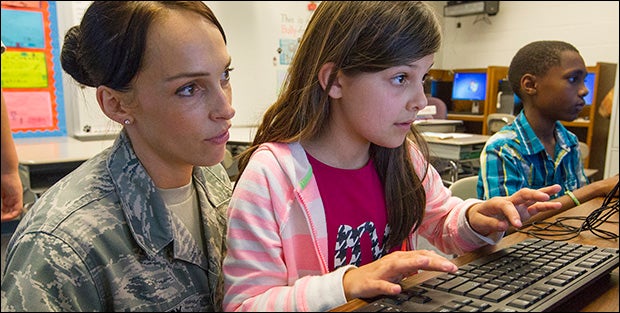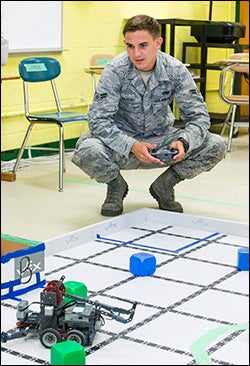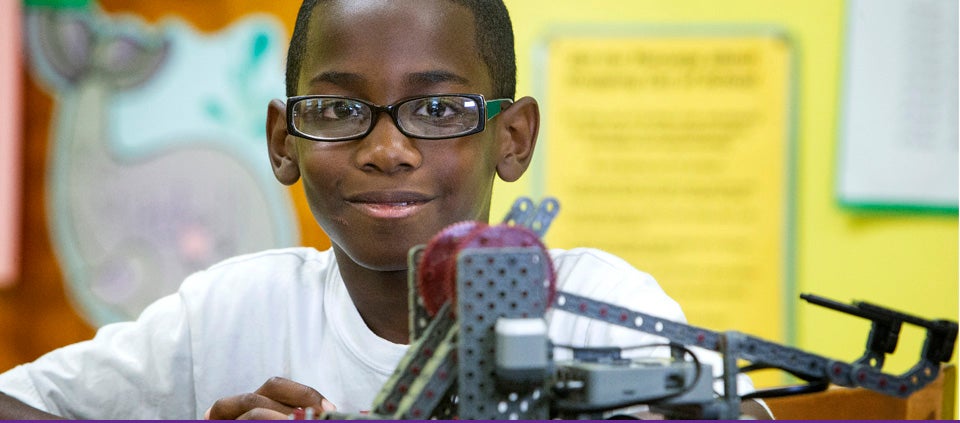POSITIVE CONNECTIONS
ECU partners in Operation LINK mentoring program
Ten-year-old Tyrrek Grizzle took control of his paddle, maneuvering his miniature land mover with ease.
He and a teammate moved his robot across a grid and past an opponent to pick up as many green-colored blocks as possible and dump them in a coordinating green basket. The team that filled the basket with the most blocks in the three-minute competition won.
Grizzle attended an inaugural weeklong robotics summer camp through Operation LINK, an AmeriCorps school-based science, technology, engineering and mathematics mentoring program for elementary and middle grades students in eastern North Carolina. The STEM program, with a special emphasis on students from military families, will transition from an afterschool program to part of the regular school day this fall.
Offered this spring in Wayne County, the program aims to promote positive behaviors and success in school while keeping military youth connected to family. It’s a partnership between East Carolina University, AmeriCorps, military family support networks, veterans groups, community colleges and public schools.
Video by Cliff Hollis
The summer camp, held at Greenwood Middle School in Goldsboro, allowed students to make real robots from designs they developed in their afterschool program.Counselors and campers used a box kit to construct a robot with up to 650 pieces. A software program developed at Carnegie Mellon Robotics Academy gave the students the ability to control movements.
“We had fourth-graders writing code,” said Michael “Mike” Dermody, associate professor of cinematic arts and media production in the ECU School of Art. Dermody, who grew up in a military family, said “It’s amazing how quickly they adapt. It’s a very tactile and hands-on experience. They go in and test and modify it. There’s lots of activity between the computer itself and the robot.”

Amy Perry, left, watches as her daughter, Kayla Perry, works at the Operation LINK afterschool program held this spring in Goldsboro. Amy Perry is a technical sergeant in the U.S. Air Force, where she inspects aircraft for defects at Seymour Johnson Air Force Base.
For Grizzle, a rising fifth-grader at Tommy’s Road Elementary School, taking his work from the computer lab to create a functioning robot is exciting. “Robots help you in a lot of ways,” said Grizzle. “They help us do things we can’t normally do ourselves.” Grizzle has cousins who serve in the military.
The pilot program will become part of the curriculum this fall at three Wayne County schools with a higher population of children from military families, said Lou U. Rose, Operation LINK coordinator in the ECU College of Education, which has facilitated the program.
“We will be able to impact more kids that way.”
Area teachers observed some of the program activities. “Some will do it as an elective in science and math classes,” Rose said.
“The beauty of this is they can tailor it and run with it and be creative. It brings relevancy in the real world, and maybe will get students interested in science.”
Michael Giddens, an AmeriCorps camp mentor who earned a teaching certificate in middle grades science and math from ECU in May, said students learned to collaborate and work as a team at the camp.

USAF airman first class Eagan Nadeau pilots one of the student robots.
“The energy has been electrifying,” Giddens said. “Keeping them (students) engaged is a challenge in the classroom in the 21st century.”
One old-fashioned value students have learned has been patience, Giddens said, such as when broken robots have had to be re-assembled. Now poised to reach more students, the initial idea for the Operation LINK program was to create a way for military parents to interact with their children – via the web – while the parents were away from home. “It’s (been) a way to keep the child connected,” Dermody said.
Amy Perry’s nine-year-old daughter Kayla and 10-year-old daughter, Alexis, participated in the afterschool program. Perry, a technical sergeant in the U.S. Air Force, inspects aircraft for defects at Seymour Johnson Air Force Base. The Perry family doesn’t have a computer, internet or cable in their home. So the program has helped support her girls’ interests in science and technology. “It works for us,” she said.
Perry said the counselors encouraged her daughters’ unique personalities. “It’s allowing them to have the space to be who they are,” she said. “Respecting others is important.”
Kayla Perry said she enjoyed the computer lab and making a virtual robot. “I like the teachers. All the time they think of cool things for us to do,” she said. “They always come up with these amazing ideas.”
Program activities have helped build relationships between mentors and students, and among students, said Virginia Harris, a retired teacher and military spouse who taught 23 years in several states and overseas.
“I’ve seen changes in the students, being able to work together and learning to follow rules better,” Harris said. “One of the main things they learn is you’re not an island. You have to get along with people in life. I think it’s difficult for little people to work together as a team sometimes.”
To learn more, visit www.ecu.edu/operationlink.

Logan Chase, 10, works on programming after a practice session with his robot.
